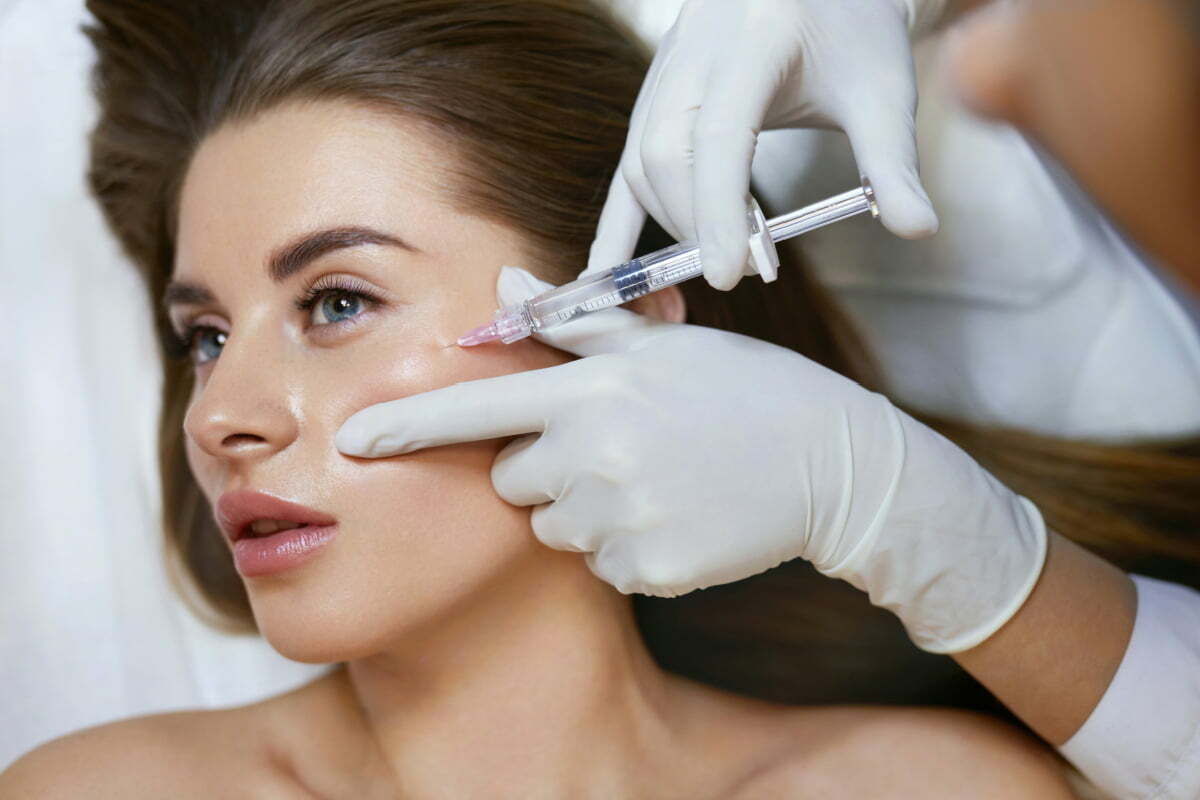There has been much discussion lately around whether or not it’s safe to get cosmetic injections before or following a COVID-19 vaccine, and how long to wait. These questions began to arise in December 2020 after it was reported that a few patients experienced temporary swelling around their existing dermal fillers following vaccination. In this post, we examine the safety of cosmetic injections and answer your top questions about how they interact with the COVID vaccine.
Dermal fillers and Botox have a long, safe history
Before we dive into how facial fillers and Botox interact with the COVID vaccine, let’s take a look at their safety record.
Dermal fillers are substances that sit under the surface of the skin for roughly 6-12 months. They are comprised of either hyaluronic acid, calcium hydroxylapatite, poly-L-lactic acid, or polymethylmethacrylate. Injectable fillers have been used safely and effectively as an aesthetic enhancement for nearly 50 years. (If you have seen filler horror stories, note that those complications are most often caused by unscrupulous providers injecting unsafe filler materials, not FDA-approved products used as directed.)
Botox is a neuromodulator that blocks the signals between your nerves and muscles. When Botox is injected into a muscle, it quickly goes to work relaxing the muscle and limiting its movement to reduce the appearance of lines or wrinkles in the surrounding skin. While Botox is a neurotoxin, it is used in such small doses that it carries very little risk to the nervous system; in fact, only 36 adverse Botox reactions were reported from 1989-2003.
Can the COVID vaccine cause dermal fillers to swell?
Though the coronavirus vaccine—and all other vaccines, for that matter—can temporarily cause minor swelling in patients with dermal fillers, this side effect is extremely rare (only 3 reactions were attributed to fillers out of 15,184 vaccine recipients in Moderna’s Phase 3 Trial). Minor swelling is a completely normal reaction to a vaccine and is not exclusively an issue with the COVID vaccine or with dermal fillers.
Minor swelling is a completely normal reaction to a vaccine and is not exclusively an issue with the COVID vaccine or dermal fillers.
The swelling that some patients have experienced around their fillers is a delayed allergic reaction (it usually takes a few days for symptoms to arise) known as a Type IV hypersensitivity reaction. This reaction is thought to be caused by the body attempting to dispel a foreign object—in this case, a dermal filler—and is intended to protect us. After your body has adjusted to the vaccine, swelling diminishes and your immune system is able to return to its normal state.
Can the COVID vaccine cause Botox to swell?
Patients who have received Botox injections should not experience any swelling after receiving a vaccine. This is because Botox is a neurotoxin that is injected into muscle and is quickly dissolved, whereas dermal filler injections remain under the skin for 6-12 months.
That said, we recommend patients be overly cautious and follow the guidelines below for receiving Botox injections.
How Long Should I Wait to Get Botox or Fillers After My Vaccine?
Out of an overabundance of caution, we recommend our patients wait at least 2 weeks before and after their COVID vaccine to receive Botox or dermal filler injections. If you have a 2-dose shot, like the Moderna or Pfizer vaccine, you shouldn’t get Botox or fillers between your vaccine shots, as there isn’t enough time to prevent a reaction.
Will swelling affect my fillers?
In the rare event you do experience swelling around your fillers, there is no reason to believe they will be negatively impacted. Your filler results should appear completely normal after the swelling subsides, usually about a few days.
Does it matter where I get my cosmetic injections?
The area of your body where you receive a dermal filler injection could potentially influence swelling from the vaccine. This is because fillers in areas that are very mobile, like the lips or mouth, typically don’t last as long as fillers that are in immobile parts of the body, like the chin or nose. Therefore, a patient who has received lip filler may be less likely to experience swelling around their fillers 6+ months after their injection than a patient who has received chin filler. We still advise patients to wait 2 weeks to get their filler regardless of location.
Should I get the COVID vaccine if I’ve had Botox or fillers?
In sum, we encourage all of our patients to receive the COVID vaccine if they are eligible and don’t have serious underlying health conditions. If you’ve had Botox or fillers, work with your healthcare provider to plan your vaccine at least 2 weeks after your last cosmetic injection.
Contact your healthcare provider if you experience severe swelling after your vaccine
While it is normal and safe for you to experience some swelling around your facial fillers after your COVID vaccine, immediately contact a qualified healthcare provider if you experience more extreme side effects such as severe swelling, shortness of breath, severe pain, and/or fever.
If you are considering Botox or dermal filler injections in the Detroit/St. Clair Shores area but are concerned about their safety, board certified plastic surgeon Dr. George Goffas would be happy to discuss them with you further. Contact our practice online or call (586) 773-6900.

